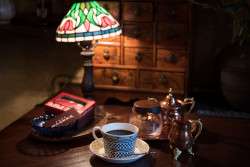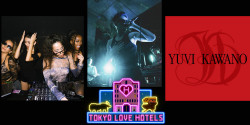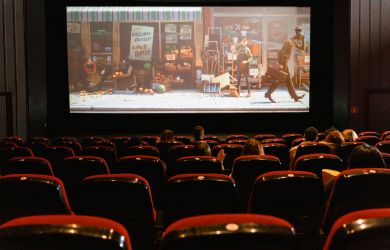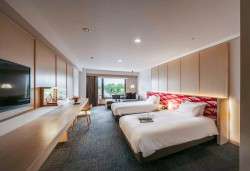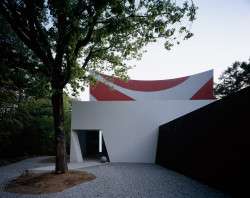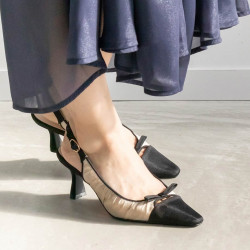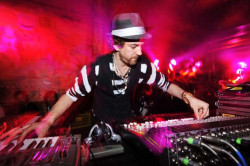
January 19, 2006
We Love Tokyo
From the quirky to the cultural, explore more of Japan’s eclectic delights in 2006, because only here can you…
By Metropolis
Originally published on metropolis.co.jp on January 2006

Alex Vega
Tsukiji is one of Tokyo’s major tourist attractions, but it’s also somewhere to keep going back to no matter how long you live here. Once is usually enough for the market, but you can never get enough of fresh sushi, and the 24-hour restaurants outside the market are one of the city’s true pleasures. Where else in the world can you enjoy such quality raw fish in the small hours of the morning with a cold glass of beer or sake in hand? Sushi Zanmai has three restaurants in the area, of which the honten main shop is the most atmospheric. Prices are reasonable, with bintoro and salmon at ¥98 a piece. A night on the town that ends in Tsukiji is certain to be one to remember.
Sushi Zanmai Honten, 4-11-9 Tsukiji, Chuo-ku. Tel: 03-3541-1117. Open 24 hours. Nearest stn: Tsukiji.

photos Courtesy of Mai Foot
Get a “cos-play” foot massage
French maid cafés are so 2005. This year’s Akiba favorite is the French Maid foot massage. At Melty Cure, the costumed therapists will help you melt “like butter” and cure you of all your stress with their admirable massage skills. Down the street, Mai Foot (pictured) offers reflexology, handcare, eyecare, aromatherapy and an oxygen bar. The maids, who post messages on the website, include Alice (“Master, teach me many things”), Yuuna (“I’m a machine gun talker”) and Poko Nyan (“I’m a twisted maid, but yoroshiku”).
Reflexology treatments at both establishments start at ¥2,000. Melty Cure: 3F, 4-6-2 Soto-Kanda. Tel: 03-3254-7557. Open 11am-9pm. Nearest stn: Akihabara or Suehirocho. Mai Foot: 3-1-3 Soto-Kanda, Chiyoda-ku. Tel: 03-3253-1113. Open 11am-9pm. Nearest stn: Akihabara.

Courtesy of Kobe City
Experience “The Big One”
No Tokyoite wants to experience the major earthquake predicted to strike the city at some point in the not-so-distant future, but we all have an unshakable curiosity nagging away inside us: What would—will—it be like? At Ikebukuro Bosaikan, a disaster prevention center run by Tokyo Fire Department, you can find out using their earthquake simulator that will not only let you feel a magnitude-7 quake (the predicted size of The Big One) but learn what to do to help save yourself and your loved ones. The center also demonstrates how to escape from smoke-filled rooms and how to extinguish fires.
2-37-8 Nishi-Ikebukuro, Toshima-ku. Tel: 03-3590-6565. Open 9am-5pm (last entry 4pm), closed Tuesdays and every third Wednesday. Nearest stn: Ikebukuro.

courtesy of bauhaus
Mosh with salarymen
For stressed salarymen, Bauhaus’ live band playing classic rock from Bon Jovi to Led Zeppelin combined with a few too many whiskey sodas is a recipe to do one thing: mosh. Jumping up and down and pushing each other around in suits is a kind of therapy—cheaper then a lap dance and more fun than a Thai massage, Bauhaus is a guaranteed happy ending to the work week. The band plays for 30 minutes every hour starting at 8:30pm. Air guitar compulsary.
2F Reine Roppongi Bldg, 5-3-4 Roppongi, Minato-ku. Tel: 03-3403-0092. Open: 7pm-1am. Nearest stn: Roppongi. Admission: ¥2,835.

Tama Miyake Lung
Eat monjayaki floating in Tokyo Bay
Kansai is known for okonomiyaki, but Tokyo has its own take on the savory pancake, monjayaki. In fact, the city is so proud of the dish that a whole district is dedicated to it: Monja Town in Tsukishima. There are dozens of stores, but the random, rustic ones are the most fun (see Dining Diary, p.31). Alternatively, take a cruise on a traditional yakatabune boat for lunch or dinner and eat monjayaki as you cruise up the river or around Tokyo Bay. A true shitamachi experience.
Yakatabune: Tsukishima Monjayaki Association, 1-3-16-101 Tsukishima, Chuo-ku. Tel: 03-3533-6699. ¥4,900 per person for groups of two or more, includes all food and drinks. Boats depart 11:30am, 2, 5pm and 8pm.

Alex Vega
Relive the ‘60s
Kissa Ginza coffee shop has been open since 1962, and much of the décor is unchanged since. This isn’t retro; it’s original. A classic kissaten coffee shop by day, serving things like curry rice for lunch, Kissa Ginza turns into a time warp at night where the swinging ‘60s meet the sounds of 2006, with DJs spinning anything from funk classics to electroclash, disco lighting and tables swept aside for dancing. Check the website for party information (there’s rarely a cover charge, and when there is one it’s modest). Some customers like to dress to match the décor.
1-3-9 Ebisu Minami, Shibuya-ku. Tel: 03-3710-7320. Open 10am-late, lunch Mon-Fri 11:30am-2pm, closed Sun. Nearest stn: Ebisu. www8.plala.or.jp/dj

courtesy of tate-do
Swordfight like samurai
You don’t have to be Tom Cruise to get the Ken Watanabe treatment and find your inner samurai. The Tate-do School in Shinjuku teaches choreographed sword fighting for stage and screen and is open to non-actors and even has classes in English. The sensei, Ryuji Kikuchi, has choreographed fights for numerous productions and films, and shares his expertise with people who are interested in experiencing more about the samurai spirit. Students attending his classes at Toho Entertainment School learn sword techniques, fighting styles and performance scenarios using wooden or taped-up steel swords. There are courses available for actors, children, tourists and residents, and the trial lesson is free when you present your Alien Registration Card.
Toho Entertainment School, 6-12-7 Nishi-Shinjuku, Shinjuku-ku. Make reservations by email at info@tate-do.com. Nearest stn: Roppongi. www.tate-do.com

Courtesy of Fuji-Q Highland
Speed earthward down Dodonpa
When Fuji-Q Highland opened its famous Fujiyama ride in 1996 it broke records to become the tallest and fastest rollercoaster in the w orld. In 2001, the park opened Dodonpa, which blows riders away with compressed-air-powered acceleration of a mind-blowing 172kph (107mph) in just 1.8 seconds, followed by a heart-stopping 17-storey vertical drop. Of course, records don’t last long in the world of thrill-seeking (Kingda Ka in New Jersey is now the fastest and tallest), but both Dodonpa and Fujiyama are high on our must-do checklist.
5-6-1 Shin-Nishihara, Fujiyoshida, Yamanshi-ken. Tel: 0555-23-2111. Open Mon-Fri 9am-5pm, Sat, Sun & hols 9am-8pm. (July 20-Sept 20 daily 8am-9pm.) Direct buses including return travel and a free pass to the park are available from Tokyo (¥6,300 until Apr 1) and Shinjuku (¥6,100 until Apr 1) stations. info@fuji-q.com, www.fuji-q.com

Smell good
If you want to learn one Zen appreciation that will really impress, skip tea ceremony and flower arranging and take up kodo. “The way of fragrance” isn’t just about appreciating the subtleties of incense, but also purifying the self, refreshing the mind and creating a sense of one with the eternal. The Center for Arts and Wellness in Setagaya-ku holds incense ceremonies “for relaxation and self-awareness,” with calligraphy or watercolors and haiku poetry. Appointments are required and there is a ¥4,000 charge that includes materials. Email eriyo@arts-wellness.com for more information. Remember: Don’t just smell the smell; understand the smell.
Rm. 301, 3-20-15 Tsurumaki, Setagaya-ku. Tel: 03-5450-8522. Nearest stn: Sakura-Shinmachi. www.arts-wellness.com

courtesy of excel air
Take a helicopter ride over the megalopolis
Tokyo seems to come alive at night, when the gray skin of the city starts to glow, the pulsing lights of the skyscrapers beating like the heart of the urban giant stretching beyond the horizon. The best way to appreciate the magnitude of this city, the world’s biggest, is on a nighttime helicopter ride, starting from the heliport in Urayasu and heading out over downtown Tokyo and Shinjuku. Flights take place between sundown and 9pm. The Diamond Course lasts 20 minutes (Mon-Fri ¥14,800, Sat-Sun ¥18,000) and the Pearl Course 15 minutes (Mon-Fri ¥9,800, Sat-Sun ¥12,500). Flights before sundown cost less and there are discounts for children, disabled passengers and senior citizens.
Flights over Yokohama are available from the Minato Mirai Heliport. Urayasu Heliport, 14 Chidori, Urayasu-shi, Chiba. Tel: 047-380-5555 (10am-5pm). www.excel-air.com

